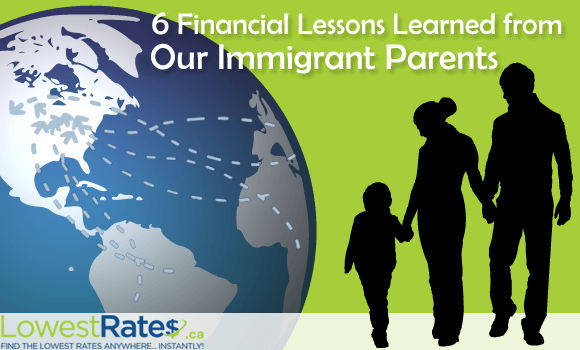6 Financial Lessons Learned from Our Immigrant Parents
By: Lucy Zemljic on July 25, 2014
“You know, we came here with nothing,” says my mother.
It’s the line I’ve heard time and time again – I know the story well. My mom uses this line when trying to convince me not to make an impulse purchase, or spend money on something I don’t really need.
“When we came to Canada we had two suitcases and a few dollars in our pockets!”
I can recite every line by heart. It’s useless to resist.
“But you do whatever you want,” she adds, and it doesn’t mean do whatever you want. It actually means listen to your mother.
Whatever shiny gadget or overpriced item I’m lusting after will have to stay on the store shelf. Deep down though, I know she’s right about this, because the story’s true – my parents did come here with almost nothing, leaving their native Croatia for chilly Canada to give my brother and me a better future. And they didn’t make it this far by splurging on unnecessary luxuries.
The financial lessons my parents taught me are the same ones that allowed them to give us the comfortable life we’ve lived in Canada. But their story is not unique, especially in multicultural Toronto, and the Lowest Rates office is no exception. Read on to find out what nuggets of financial wisdom our team members have gleaned from their immigrant parents!
On Saving
Ever since I can remember, my parents not only resisted spending on unnecessary luxuries, they saved for a rainy day like they were expecting a monsoon.
Financial advisors usually suggest putting anywhere from 10% to 20% of your budget toward “financial priorities,” like debt payment, retirement funds and saving. But when Mom and Dad first came to Canada, they saved closer to 35% of their salaries so that, eventually, they could afford the life they wanted for their new family in their new country.
When I asked her about it, my mother explained that there was simply no other way they could build the kind of life they aspired to for my brother and I. When you land in a new country with nothing (or close to it), it’s not hard to imagine that saving quickly becomes a habit – a habit that will eventually pay off. I didn’t get it as a kid, but now, I understand that their saving was what made our comfortable Canadian life possible.

On Budgeting
When I asked our web designer Tessrah if she could share some of her parents’ financial wisdom with me, she told me that she’d only recently had a financial talk with her mom.
Her mother’s advice was straightforward but so much easier said than done:
"Make a budget and stick to it.”
Tessrah explained that, when she got her job at Lowest Rates, her mom helped her flesh out a budget. “We figured that a certain portion each month would go to clothing, a certain portion to entertainment, etc. In fact, we were inspired by Gail Vaz-Oxlade’s ‘Money Jars’ budget method.”
Gail’s method involves a bit of DIY, so if you want to get hands-on with your budget, it’s a great starting point. Grab a loose-leaf binder, and on the first page, sketch out a financial plan for yourself like the one below:
Cell phone | $50 |
Transportation | $125 |
Clothes | $70 |
Entertainment | $100 |
Other | $50 |
Afterwards, take each one of your ‘money jar’ categories and dedicate one page of your binder to filling in your weekly spending for that category. Don’t be afraid to break it down and get specific – that way, you know exactly where your money is going.
According to Tessrah’s mom, “The key is balance,” and she couldn’t be more right. As with everything in life, if you balance your budget wisely, you will reap the rewards later on.

On Spending
Justin L., our product manager, says that the financial lesson that’s stuck with him the most is “don’t spend more than you have or make.”
I suspect this is a core value that many immigrant parents instil in their children – don’t spend what you don’t have, live below your means. Money management is a slippery slope, and one misstep after another could send you sliding into a pile of debt.
“My parents led by example,” explained Justin, “this taught me to appreciate all the things I have.” I have a suspicion that a lot of first-generation kids have learned this very lesson from their parents as well – appreciate what you have, because your mom and dad worked hard to help get you where you are now.
Another piece of spending advice comes from our digital marketing manager’s mom:
“I'm not rich enough to buy cheap things!” says Gozde’s mother. “Don't go buying cheap things that will wear and tear easily... spend a little bit more now on ONE quality item because that will save you money in the long run.”
Gozde’s mom has hit an all-too-forgotten truth in this age of “more (and cheaper) is better”. Spending more money now on one well-made, good quality item is worth more than spending less money on a bunch of cheap products. While a cheap product or clothing item might cost less in the moment, you’ll have to replace it much sooner and end up spending even more than you would have if you’d stuck with quality.

On Credit
My grandfather has never used a credit card in his life. His words of wisdom are old-school but effective: “If you don’t have the cash to buy something, don’t buy it!”
Then again, my grandpa came to Canada in 1974 when the economy was booming and you could go see a movie for a dollar and 79¢.
The “cash or nothing” approach works for some, but I prefer my dad’s words of credit card wisdom: “Use your credit card, but always pay your balance on time – in full – every month.”
Now that’s more realistic for the year 2014. And Dad speaks from years and years of diligent credit card repayment. If you can, try to pay your balances in full every month, that way you don’t have to pay any interest at all.
My mom’s piece of credit card advice?
“If you’ve got a go-to grocery store or retailer, use their loyalty credit card so you can build up points for free purchases.”
Mom never leaves the house without her rewards points card, and it’s bought her more than a few free grocery store purchases. If you prefer more flexibility, (or if your grocery store loyalty is divided), go for a card that offers points with multiple retailers and restaurant chains so you can rack up points across the board.

The Final Word
There’s an unspoken bond between first generation Canadian kids – at least, I like to think so. As much as we look to the past and appreciate our parents’ struggles, we also look to the future to build up our own lives – financially and otherwise – so we can make them proud. And if we’re lucky, our parents will be there every step of the way to keep dishing out that financial (and life) advice.


